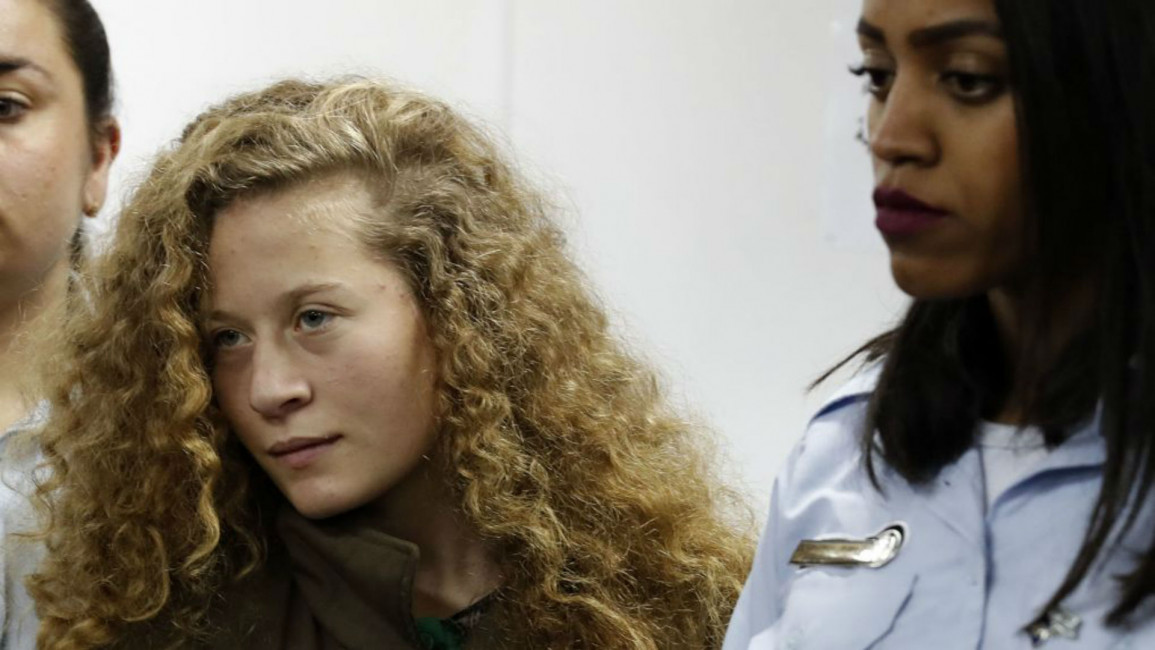
Ahed Tamimi will remain a prisoner until Israeli occupation ends
Her crime? Slapping a heavily armed Israeli soldier who had entered her home in the occupied West Bank, a soldier who belonged to the same company that shot her younger cousin - 15-year-old Mohammed Tamimi - in the face just months earlier, permanently disfiguring him.
"The left side of his face is twisted, swollen, fragmented, scarred; there's congealed blood by his nose, stitches in his face; one eye is shut, a seam line stretches across his whole scalp. A boy's face turned scar-face. Some of his skull bones were removed in surgery and won't be returned to their place for another six months" is how the Israeli newspaper Haaretz described her cousin's facial wounds, shortly after his surgery.
It's impossible to tell the story of Ahed Tamimi without providing the context that brought about the face slap, context that was often lacking when the international media initially reported her arrest.
Sadly, yet predictably, her release from prison has been decontextualised in the same manner as her arrest, and incarceration. "Ahed Tamimi, Palestinian viral video slap teenager, freed in Israel," reads the BBC's headline. "Palestinian teen who slapped Israeli soldier freed from prison" reads CNN's headline.
The question must be asked: Freed from what exactly?
Tamimi is only replacing a smaller prison for a larger Israeli prison, otherwise known as the occupied West Bank, which has not only been sealed off by a 650 kilometre long and 8 metre high separation barrier, but also has been carved up into disconnected cantons.
 |
What is left of her ancestral Palestinian homeland is now her prison |  |
Moreover, Israel maintains control over Palestinians in the occupied territories via a system of colour-coded identification cards, which has been likened to the system used by the apartheid South African regime during the 1980s - one that controlled the movement of blacks, and helped maintain their inferior status.
As a West Bank Palestinian, Tamimi is not only required to show her Green ID card when moving from one part of her ancestral homeland to the other via a series of Israeli military controlled checkpoints, but is also unable to travel to Jerusalem or Gaza without obtaining a special permit from Israel.
Twitter Post
|
These special permits have become harder, and almost impossible for West Bank Palestinians to obtain. Given Tamimi was imprisoned for 'abusing' an Israeli soldier, she can probably count on never being granted a permit to leave the occupied West Bank.
Tamimi, like nearly 4 million Palestinians in the occupied territories, and another 6 million Palestinian refugees in neighbouring Arab countries, is rendered stateless by Israel. With no citizenship or passport, Tamimi will never be able to travel, study or work abroad. She will forever be a prisoner of the Israeli occupation.
To drive from the northernmost point of the West Bank to the southernmost takes several hours by car, while a west to east journey takes no more than an hour. What is left of her ancestral Palestinian homeland is now her prison. Israeli military checkpoints essentially demark her cell blocks.
Even within the occupied West Bank, Tamimi has to navigate a system of apartheid, where there is one rule for illegal Israeli settlers and another for Palestinians.
Last year, Israel's parliament passed a law legalising the dispossession of Palestinian owned property, authorising the construction of Israeli settlements on privately owned Palestinian land, so as the settlers acted in "good faith," widely seen as Israel's effort to formalise its annexation of the West Bank.
At any given moment in time, Israel can declare Tamimi's village of Nabi Saleh a "closed military zone", like it did earlier this year, when the Israeli military closed off all entrances and exists to deny journalists and human rights activists access to the village, which was widely viewed as an attempt to collectively punish Tamimi's friends, family and neighbours.
Again, lest we forget the teenager was imprisoned for having the audacity to stand up to a brutal military occupation, one that had not only killed a number of Palestinians in her village, but also had imprisoned her father.
 |
Israeli military checkpoints essentially demark her cell blocks |  |
Regrettably for Israel, however, its inhumane and unjustifiable actions against her have turned the 17-year-old Tamimi into a global phenomenon.
Today millions more around the world are familiarising themselves with the daily brutality of the Israeli occupation. She has given a face to Palestinian injustice, and while she may have merely traded one prison cell for another, Israel can be sure its chosen role as jailer and occupier of the Palestinian people will end at some point during Tamimi's adult years.
Read more: Israel's ban on South African model is straight from the apartheid playbook
"My happiness is incomplete because there are other prisoners still in the Israeli jails," said Tamimi upon her release.
Her courage will last forever. Israel's moral cowardice cannot.
CJ Werleman is the author of 'Crucifying America', 'God Hates You, Hate Him Back' and 'Koran Curious', and is the host of Foreign Object.
Follow him on Twitter: @cjwerleman
Opinions expressed in this article remain those of the author and do not necessarily represent those of The New Arab, its editorial board or staff.


![Minnesota Tim Walz is working to court Muslim voters. [Getty]](/sites/default/files/styles/image_684x385/public/2169747529.jpeg?h=a5f2f23a&itok=b63Wif2V)




